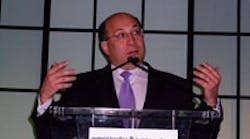Will material handling and logistics markets see more such M&A activity? All industries will, according to Ron Insana, CNBC senior analyst and commentator. He was one of the keynote speakers at the Dematic Conference, and during the Q/A portion of his presentation, he put the HK/Dematic deal in a broader perspective.
“Companies have a record amount of cash on their balance sheets,” he explained. “It’s somewhere north of $2.3 trillion for non-financial U.S. corporations. They could do several things with this. We hope they hire people. They could buy back stock which they are doing rather aggressively. They could raise dividends, which means returning cash to shareholders. Or they can engage in M&A. We have excess capacity in a variety of industries around the world and there will be a lot of consolidation, especially at the small end. It will accelerate in the absence of other economic opportunities.”
Not all potential acquisitions promise pretty outcomes, however. Insana speculated on the impact the General Motors initial public offering could have if China plays a part.
“If you think people are mad now wait until we complete a bailout of GM, take it public and have the Chinese take a 25% stake. That’d be one of the tipping points for the Tea Party movement. We’ll go from talking about [Senate nominee] Christine O’Donnell’s witchcraft to a series of other issues that are far more germane to a conversation about the economy.”
In fact, Insana concluded that now is a good time for M&A activity.
“Typically you see M&A cresting at the top of an economic cycle but this time we’re seeing the opposite, where there are bargains and done in such a way that from a financial perspective it’s a better use of cash than they might have otherwise in a different economic environment.”
Before Insana’s speech, Dematic’s president and CEO, John Baysore, told MH&L that this acquisition will mean a world of difference to both companies’ respective customers.
“The decision to go after an acquisition like HK was predicated on the thought we could do more for the customers,” he said. “It was about strengthening our span and solutions so we could do A to Z inside a DC, warehouse or manufacturing plant. The advantage of our being global [for HK’s customer base] is that when they build systems in different parts of the world they can still have the same look and feel, whether from a mechanical standpoint, control standpoint or a software standpoint. Therefore when companies shift people around the world to work with a system in China or Europe it’s easier to train the new people on it and the maintenance is the same.”
This marriage is starting off on a strong financial footing, according to Baysore. He said that although the official end of the recession was just announced in all the news media, he believes it ended for Dematic at the end of 2009.
“At the beginning of 2010 we were booking orders, so we’ve seen a dramatic uptick,” he explained. “Part of that is that the market has gotten stronger and part is we’ve taken market share.”
Internally, this marriage means the U.S. based operations will have regular contact with its European counterparts to further leverage its global strengths. That means two conference calls a month where the managers will discuss various aspects of their businesses, from customers to technology and products. They will also share best practices on a global basis.
As for how things will be different for HK’s president and CEO John Splude, Baysore says he will sit on Dematic’s board of directors on a global basis, playing a consultative role.


